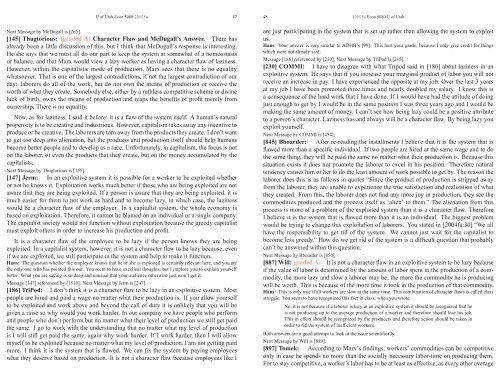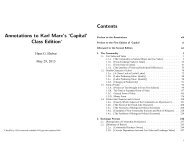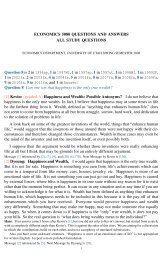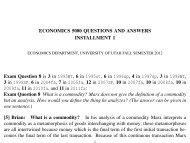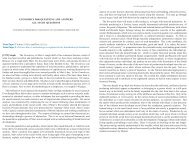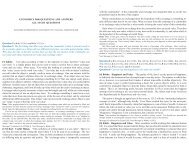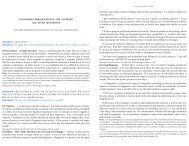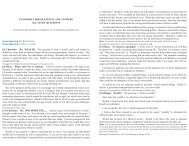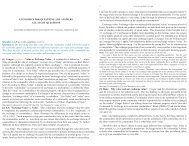Question 1 What did Marx mean with his formu - University of Utah
Question 1 What did Marx mean with his formu - University of Utah
Question 1 What did Marx mean with his formu - University of Utah
Create successful ePaper yourself
Turn your PDF publications into a flip-book with our unique Google optimized e-Paper software.
U <strong>of</strong> <strong>Utah</strong> Econ 5080 2005fa 47<br />
Next Message by McDugall is [265].<br />
[145] Thugtorious: (graded A) Character Flaw and McDugall’s Answer. There has<br />
already been a little discussion <strong>of</strong> t<strong>his</strong>, but I think that McDugall’s response is interesting.<br />
He/she says that we must all do our part to keep the system at somewhat <strong>of</strong> a homeostasis<br />
or balance, and that <strong>Marx</strong> would view a lazy worker as having a character flaw <strong>of</strong> laziness.<br />
However, <strong>with</strong>in the capitalistic mode <strong>of</strong> production, <strong>Marx</strong> sees that there is no equality<br />
whatsoever. That is one <strong>of</strong> the largest contradictions, if not the largest contradiction <strong>of</strong> our<br />
day: laborers do all <strong>of</strong> the work, but do not own the <strong>mean</strong>s <strong>of</strong> production or receive the<br />
worth <strong>of</strong> what they create. Somebody else, either by a ruthless competitive scheme or divine<br />
luck <strong>of</strong> birth, owns the <strong>mean</strong>s <strong>of</strong> production and reaps the benefits <strong>of</strong> pr<strong>of</strong>it merely from<br />
ownership. There is no equality.<br />
Now, as for laziness, I said it before: it is a flaw <strong>of</strong> the system itself. A human’s natural<br />
propensity is to be creative and industrious. However, capitalism takes away any incentive to<br />
produce or be creative. The laborers are torn away from the products they create. I don’t want<br />
to get too deep into alienation, but the products and production itself should help humans<br />
become better people and to develop as a race. Unfortunately, in capitalism, the focus is not<br />
on the laborer, or even the products that they create, but on the money accumulated by the<br />
capitalists.<br />
Next Message by Thugtorious is [155].<br />
[147] Jerm: In an exploitive system it is possible for a worker to be exploited whether<br />
or not he knows it. Exploitation works much better if those who are being exploited are not<br />
aware that they are being exploited. If a person is aware that they are being exploited, it is<br />
much easier for them to not work as hard and to become lazy, in which case, the laziness<br />
would be a character flaw <strong>of</strong> the employer. In a capitalist system, the whole economy is<br />
based on exploitation. Therefore, it cannot be blamed on an individual or a single company.<br />
The capitalist society would not function <strong>with</strong>out exploitation because the greedy capitalist<br />
must exploit others in order to increase <strong>his</strong> production and pr<strong>of</strong>it.<br />
It is a character flaw <strong>of</strong> the employee to be lazy if the person knows they are being<br />
exploited. In a capitalist system, however, it is not a character flaw to be lazy because, even<br />
if we are exploited, we still participate in the system and help to make it function.<br />
Hans: The question whether the employee knows that he or she is exploited is certainly relevant here, and you are<br />
the only one who has pointed t<strong>his</strong> out. You seem to have excellent thoughts, but I implore you to explain yourself<br />
better. <strong>What</strong> you are saying is so deep and unusual that your audience otherwise just won’t get it.<br />
Message [147] referenced by [1510]. Next Message by Jerm is [247].<br />
[186] TriPod: I don’t think it is a character flaw to be lazy in an exploitive system. Most<br />
people are hired and paid a wage no matter what their production is. If you allow yourself<br />
to be exploited and work above and beyond the call <strong>of</strong> duty it is unlikely that you will be<br />
given a raise so why would you work harder. In our company we have people who perform<br />
and people who don’t perform but no matter what their level <strong>of</strong> production we still get paid<br />
the same. I go to work <strong>with</strong> the understanding that no matter what my level <strong>of</strong> production<br />
is I will still get paid the same, again why work harder. If I work harder, then I will allow<br />
myself to be exploited because no matter what my level <strong>of</strong> production, I am not getting paid<br />
more. I think it is the system that is flawed. We can fix the system by paying employees<br />
what they deserve based on production. It is not a character flaw because employees like I<br />
48 2005fa Econ 5080 U <strong>of</strong> <strong>Utah</strong><br />
are just participating in the system that is set up rather than allowing the system to exploit<br />
us.<br />
Hans: Your answer is very similar to ADHH’s [99]. T<strong>his</strong> hurt your grade, because I only give credit for things<br />
which were not already said.<br />
Message [186] referenced by [230]. Next Message by TriPod is [215].<br />
[230] COMMI: I have to disagree <strong>with</strong> what Tripod said in [186] about laziness in an<br />
exploitive system. He says that if you increase your marginal product <strong>of</strong> labor you will not<br />
receive an increase in pay. I have experienced the opposite at my job. Over the last 3 years<br />
at my job I have been promoted three times and nearly doubled my salary. I know t<strong>his</strong> is<br />
a consequence <strong>of</strong> the hard work that I have done. If I would have had the attitude <strong>of</strong> doing<br />
just enough to get by I would be in the same position I was three years ago and I would be<br />
making the same amount <strong>of</strong> money. I can’t see how being lazy could be a positive attribute<br />
to a person’s character. Laziness has and always will be a character flaw. By being lazy you<br />
exploit yourself.<br />
Next Message by COMMI is [454].<br />
[845] Bboarder: After re-reading the installments I believe that it is the system that is<br />
flawed more than a specific individual. If two people are hired at the same wage and to do<br />
the same thing, they will be paid the same no matter what their production is. Because t<strong>his</strong><br />
situation exists it does not promote the laborer to excel in <strong>his</strong> position. Therefore natural<br />
tendency causes him or her to do the least amount <strong>of</strong> work possible to get by. The reason the<br />
laborer does t<strong>his</strong> is as follows in quotes “Since the product <strong>of</strong> production is stripped away<br />
from the laborer, they are unable to experience the true satisfaction and realization <strong>of</strong> what<br />
they created. From t<strong>his</strong>, the laborer does not find any more joy in production; they see the<br />
commodities produced and the process itself as ‘alien’ to them.” The alienation from t<strong>his</strong><br />
process is more <strong>of</strong> a problem <strong>of</strong> the exploited system than it is a character flaw. Therefore<br />
I believe it is the system that is flawed more than it is an individual. The biggest problem<br />
would be trying to change t<strong>his</strong> exploitation <strong>of</strong> laborers. You stated in [2004fa:30] “We all<br />
have the responsibility to get rid <strong>of</strong> the system. We cannot just wait for the capitalist to<br />
become less greedy.” How do we get rid <strong>of</strong> the system is a difficult question that probably<br />
can’t be answered <strong>with</strong>in t<strong>his</strong> question.<br />
Next Message by Bboarder is [850].<br />
[887] Will: graded A– It is not a character flaw in an exploitive system to be lazy because<br />
if the value <strong>of</strong> labor is determined by the amount <strong>of</strong> labor spent in the production <strong>of</strong> a commodity,<br />
the more lazy and slow a laborer may be, the more the commodity he is producing<br />
will be worth. T<strong>his</strong> is because <strong>of</strong> the more time it took in the production <strong>of</strong> that commodity.<br />
Hans: T<strong>his</strong> is only true if all workers are slow at the same time. T<strong>his</strong> combination <strong>of</strong> character flaws is called class<br />
struggle. You seem to have recognized t<strong>his</strong> fact in class, when you wrote:<br />
No, it is not because if a laborer is lazy in an exploitive system it should be recognized that he<br />
is not producing up to the average production <strong>of</strong> a worker and therefore should lose <strong>his</strong> job.<br />
T<strong>his</strong> in effect should be recognized by the producers and therefore action should be taken in<br />
order to rid the system <strong>of</strong> inefficient workers.<br />
Both answers are a good attempt to look at the issue scientifically.<br />
Next Message by Will is [889].<br />
[897] Tomek: According to <strong>Marx</strong>’s findings, workers’ commodities can be competitive<br />
only in case he spends no more than the socially necessary labor-time on producing them.<br />
For to stay competitive, a worker’s labor has to be at least as effective, as every other average


